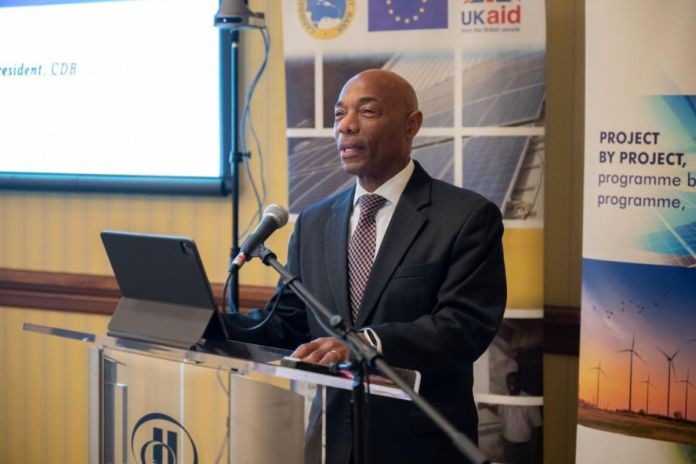BRIDGETOWN, Barbados – Fast and just. These are the foremost principles which must underpin the renewable energy (RE) transition in the Caribbean, asserts president of the Caribbean Development Bank (CDB), Dr Hyginus ‘Gene’ Leon.
Speaking this week to scores of energy sector stakeholders from across the region at the start of the Bank’s Regional Regulatory ASERT 2030 (Accelerated Sustainable Energy and Resilience Transition 2030) Dialogue, Dr Leon flagged the slow pace of RE implementation in the Caribbean and the urgency of the moment.
“…The pace and scale of the implementation of renewable energy in the Caribbean has been unacceptably slow, with an average annual investment in RE capacity averaging US$ 75 million compared to the approximate US$ 1.3 billion per annum which is needed to achieve the regional target,” he stated.
The bank’s president sounded a note of warning about how the slow energy transition will impact economies on a wider scale if not redressed.
“…There can be no sustainable development without sustainable energy. We are well aware that none of our efforts to build resilience and sustainability in the critical sectors of our economies and societies will yield success without an affordable, reliable supply of energy,” stated Dr Leon.
At the same time, he urged those regulating the sector, to ensure that the renewable energy transition is just and inclusive.
“The matter of a just transition is an area of emphasis because there is a risk that well-capitalised private institutions could profit disproportionately in meeting the scale of investment required, given limitations of fiscal space in the public sector. If inappropriately regulated, vulnerable communities and groups could also benefit less than proportionately from the energy transition,” he cautioned.
He advised that high-quality governance of the energy sector was the best defence against this, calling it “the only way to ensure that no one is left behind.”
“When we consider the current challenges that are retarding our progress, whether it be the need to balance the political, technical, and economic objectives; having to treat with legacy issues such as the exclusivity of integrated monopoly utility, and potential stranded assets; or ensuring that risks are allocated appropriately between public and private sectors – the solutions to these and other challenges are a function of governance. Indeed, a mutually agreed approach for an appropriate governance framework will undoubtedly set the scene for an accelerated penetration of RE and ultimately achievement of the regional target,” stated the CDB president.
The two-day event led by CDB in partnership with the Organization of Caribbean Utility Regulators (OOCUR), brought together decision-makers and leaders from government energy ministries and regulatory bodies from the Bank’s 19 Borrowing Member Countries (BMCs). It also brought together key development partners working in the energy space in the region – the government of Canada, the government of the United Kingdom, the European Union, the United States Agency for International Development (USAID), Inter-American Development Bank (IDB), and the Caribbean Centre for Renewable Energy and Energy Efficiency (CCREEE).
Some key outcomes of the dialogue included stakeholders and regulators identifying key priorities for support, and commitments by CDB and partners for technical assistance funding to strengthen regulatory frameworks and capacity across BMCs by BMCs and regulators.
The event also saw clear measures being proposed to increase coordination efforts among partners active in supporting regulatory strengthening and reforms, and a proposal for a minimum regulatory function (MRF) deemed necessary for adoption by BMCs in order for them to unlock private investments in sustainable energy.
CDB and the other development partners present signalled their commitment to support countries in implementing in the short-term, the key elements of an MRF adopted by them.





